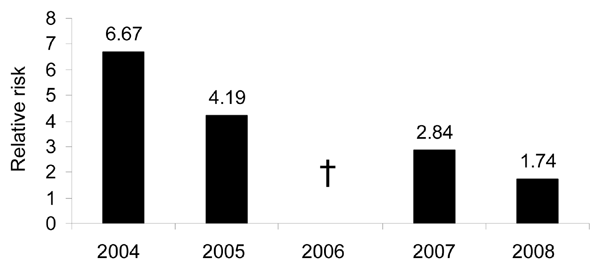Volume 16, Number 9—September 2010
CME ACTIVITY - Research
Illicit Drug Use and Risk for USA300 Methicillin-Resistant Staphylococcus aureus Infections with Bacteremia
Figure

Figure. Association between illicit drug use and USA300 methicillin-resistant Staphylococcus aureus bacteremia among 300 veterans at 4 Veterans Affairs medical centers, USA, 2004–2008 (generalized linear model p value for trend over time = 0.23). †No illicit drug users had a bacteremic infection caused by USA300 MRSA in 2006.
Page created: August 28, 2011
Page updated: August 28, 2011
Page reviewed: August 28, 2011
The conclusions, findings, and opinions expressed by authors contributing to this journal do not necessarily reflect the official position of the U.S. Department of Health and Human Services, the Public Health Service, the Centers for Disease Control and Prevention, or the authors' affiliated institutions. Use of trade names is for identification only and does not imply endorsement by any of the groups named above.